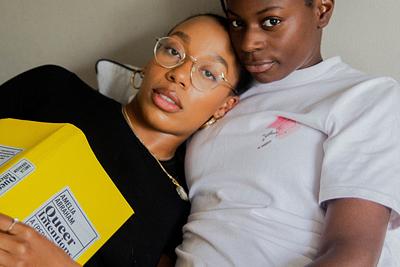Looking for all Articles by Éadaoín Lynch?
Reading as an LGBTQ+ lifeline
Books support and empower marginalised people – for the LGBTQ+ community, research shows that literature provides much-needed solace, representation, and opportunities to imagine a better life

Please note this article contains a number of acronyms or umbrella terms, e.g. Queer, LGBTQ (Lesbian, Gay, Bisexual, Transgender, Queer), QTIPOC (Queer, Trans, or Intersex People of Colour), or LGBTQ+ (Lesbian, Gay, Bisexual, Transgender, Intersex, Queer/Questioning, and more). We acknowledge the limitations of this terminology.
Our readers and partners may identify as LGBTQ+, or another sexual, racial, ethnic, or gender identity, and we welcome all those who believe books, reading and writing have the power to change lives.
Content warning: references to discrimination
The stats
LGBT Youth Scotland published their 'Life in Scotland for LGBT Young People(this link will open in a new window)' report in April 2022, capturing comparable experiences of young people since 2007. It contains insightful – and concerning – data regarding LGBTQ+ experiences throughout areas of discrimination, wellbeing and education.
There has been a profound decrease in the number of young people who think 'Scotland is a good place to be LGBTI' (65% in 2022, down from 81% in 2017).
37% of the survey participants indicated that they were happy or very happy with their life as an LGBTQ+ young person in Scotland. This is another decrease, from 57% in 2017, and 66% in 2012.
Reading practices
In February 2022, Amelia Abraham – writer at the Guardian and British Vogue – penned an editorial for Penguin, ‘Why queer literature is vital for people growing up LGBTQ+(this link will open in a new window)’ in which they outline, in no uncertain terms,
For many of us who are LGBTQ+, queer literature can provide solace, joy, a lifeline.
This is echoed, implicitly and explicitly, throughout research around the reading habits of LGBTQ+ people, at least as far back as 2004: for the Canadian Journal of Information and Library Science that year, academic Paulette Rothbauer conducted 'an investigation into the power of reading, the act of reading itself, to change lives.'
For her article, she examined lesbian communities' reading practices, and cogently illustrated the significance of reading as both a vehicle for self-identification and for community access.
Readers in her study 'had few pictures of what it meant to live healthy, happy productive lives' and '[o]ne place they looked for them was in fictional narratives.'
As indicated by further research into The Reading Habits and Preferences of LGBTIQ+ Youth(this link will open in a new window),
Studies of LGBTIQ+ youth reveal that LGBTIQ+ identity development processes are their primary motivators to read. Through reading, they seek out others like themselves, role models, and safe spaces to live as they wish. […] For younger LGBTIQ+ people, the motivation to read begins as an escape from hostility.
This claim proves a long-standing knowledge in the queer community.
'[I]t was the LGBTQ+ books I was encountering at university that helped me feel less shameful about my queerness,' says Abraham(this link will open in a new window), listing some of their highlights, from Susan Sontag's diaries, to Eileen Myles' Chelsea Girls, to James Baldwin's Giovanni's Room:
'Reading them, I encountered models for what my life could look like; I entered a world of possibility.'
A safe harbour for everyone
Unfortunately, as research indicates, lack of representation, or diversity of stories, is a major impediment(this link will open in a new window) for those with multiple intersections of marginalised identity:
LGBTIQ+ youth with multiple identities – LGBTIQ+ youth of colour and LGBTIQ+ youth with disabilities in particular – remain underrepresented in traditional reading materials.
To illustrate how much more this cross-section of identities impacts youth with disabilities: the LGBT Youth Scotland report(this link will open in a new window) shows that, 'Just 38% of the participants felt that there are enough places where they can safely socialise and be open about their sexual orientation or gender identity. This figure was lower again for disabled participants at 32%.'
Similarly, LGBTQ+ and gender non-conforming youth of colour are 'more vulnerable within the school system and institutions of power,' where they often 'become a subject of detention, suspensions, expulsion […] mental health stigma […] peer violence, and many other forms of oppression,' as cited in 2019(this link will open in a new window).
These manifold oppressions prove more than ever how central reading and diversity in books are an anchor to safety(this link will open in a new window):
LGBTIQ+ youth – particularly LGBTIQ+ youth of colour – are over 120% more likely to experience homelessness than white cisgender heterosexual youth […] Homeless LGBTIQ+ youth depend heavily on libraries and LGBTIQ+ community centres for temporary shelter, access to services, information, and computers.
The act of reading changes lives. In addition to these testimonials from LGBTQ+ authors, it has been proven that reading for pleasure is a demonstrable factor in an individual's success(this link will open in a new window), irrespective of their socio-economic background.
Access to meaningful representation in books for LGBTQ+ and gender non-conforming people, particularly youth of colour, is a barrier to more than diversity; it is an issue of health and wellbeing.
At Scottish Book Trust...
Scottish Book Trust is committed to doing more. We are committed to embedding equalities thoroughly, to educating ourselves and making improvements. We know that this must be an ongoing process. We know our actions must speak louder than these words.
We welcome and champion LGBTQ+ readers and writers and are always open to feedback on how we can continue to improve and fight injustice with the life changing magic of books.